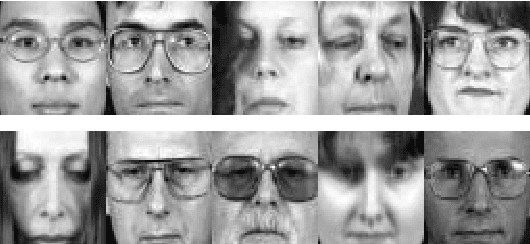Ning Yuan
Face Verification via learning the kernel matrix
Jan 21, 2020
Abstract:The kernel function is introduced to solve the nonlinear pattern recognition problem. The advantage of a kernel method often depends critically on a proper choice of the kernel function. A promising approach is to learn the kernel from data automatically. Over the past few years, some methods which have been proposed to learn the kernel have some limitations: learning the parameters of some prespecified kernel function and so on. In this paper, the nonlinear face verification via learning the kernel matrix is proposed. A new criterion is used in the new algorithm to avoid inverting the possibly singular within-class which is a computational problem. The experimental results obtained on the facial database XM2VTS using the Lausanne protocol show that the verification performance of the new method is superior to that of the primary method Client Specific Kernel Discriminant Analysis (CSKDA). The method CSKDA needs to choose a proper kernel function through many experiments, while the new method could learn the kernel from data automatically which could save a lot of time and have the robust performance.
Gradient-based Representational Similarity Analysis with Searchlight for Analyzing fMRI Data
Sep 12, 2018



Abstract:Representational Similarity Analysis (RSA) aims to explore similarities between neural activities of different stimuli. Classical RSA techniques employ the inverse of the covariance matrix to explore a linear model between the neural activities and task events. However, calculating the inverse of a large-scale covariance matrix is time-consuming and can reduce the stability and robustness of the final analysis. Notably, it becomes severe when the number of samples is too large. For facing this shortcoming, this paper proposes a novel RSA method called gradient-based RSA (GRSA). Moreover, the proposed method is not restricted to a linear model. In fact, there is a growing interest in finding more effective ways of using multi-subject and whole-brain fMRI data. Searchlight technique can extend RSA from the localized brain regions to the whole-brain regions with smaller memory footprint in each process. Based on Searchlight, we propose a new method called Spatiotemporal Searchlight GRSA (SSL-GRSA) that generalizes our ROI-based GRSA algorithm to the whole-brain data. Further, our approach can handle some computational challenges while dealing with large-scale, multi-subject fMRI data. Experimental studies on multi-subject datasets confirm that both proposed approaches achieve superior performance to other state-of-the-art RSA algorithms.
 Add to Chrome
Add to Chrome Add to Firefox
Add to Firefox Add to Edge
Add to Edge